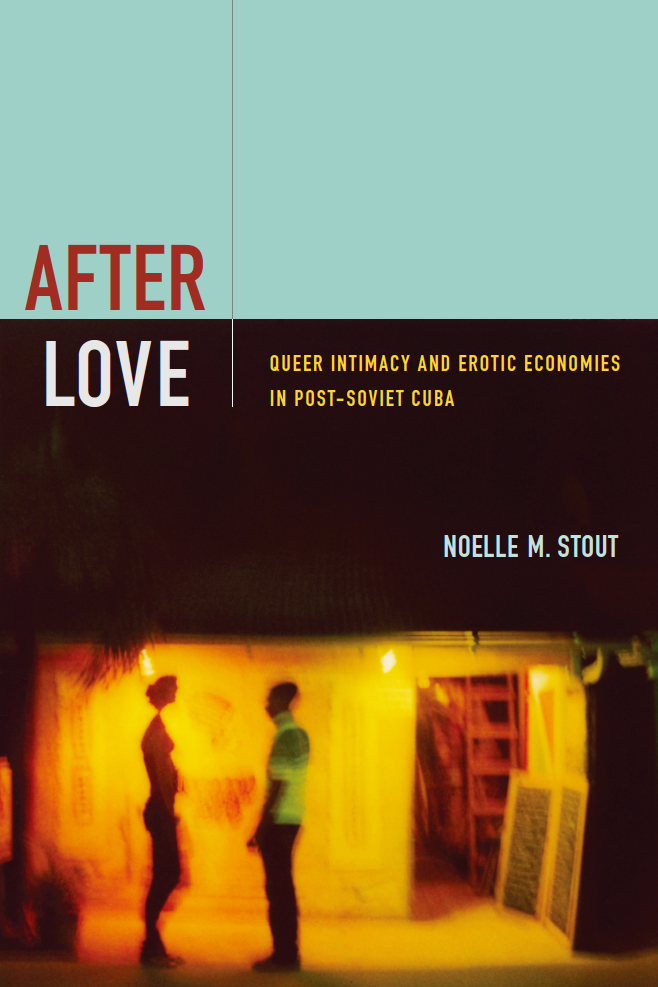Anthropologist Noelle M. Stout’s new book offers readers an important new perspective on sexuality in post-Soviet Cuba. Stout distinguishes her work from other studies of post-Communist transitions by shifting her focus away from the macroeconomic questions that characterize most studies in the field. Her work draws key connections between economics and interpersonal relations in order to understand how Cubans “make sense of their lives, their relationships, and their place in … [a] shifting economic terrain” (p. 3). Stout further distinguishes her study by eschewing the typical focus on heterosexual encounters in favor of an examination of homoeroticism and globalization. Stout chose to focus on changing notions of intimacy and love, specifically, because they are “diagnostic of broader social trends brought about by post-Soviet economic restructuring” (p. 186).
Framing her study as an analysis of “intimate economies,” Stout avoids the pitfall of conflating intimacy with sexuality. Instead, she scrutinizes a range of interpersonal relationships from the familial to the sexual in order to understand how intimacy (as both a concept and a set of behaviors) changed with the introduction of capitalism to Cuba. During the decade she spent in the field, Stout conducted approximately one hundred formal and informal interviews with individuals from a variety of different ethnic backgrounds—including twenty-two foreign tourists—who primarily identified as gay. All of her Cuban-born subjects were raised under socialism, and all of them have experienced profound changes in their intimate lives as a result of the economic and political shifts taking place on the island.
Cuba’s entry into global capitalist markets in the years since the cessation of Soviet aid has required changes—namely, the reintroduction of tourism—that stand at odds with orthodox socialism. Critics of the new economic program point to the restratification of Cuban society, the rise of the commercial sex trade, and a waning culture of racial equality as proof of capitalism’s corrupting effect on the island. Caught at the “crossroads of political struggles over sexual equality and the widespread introduction of transactional sex,” many of Stout’s subjects have cultivated a profound nostalgia for socialism as a system based on equality, reciprocity, and social solidarity that encouraged the growth of authentic love and desire (p. 30). This authentic love was undermined by the new emphasis on possessive individualism and commodified intimacy that accompanied the introduction of private enterprise. In other words, for them the post-Soviet economic crisis had prompted a crisis in values wherein Cubans engaged in intimate relations largely por interés (for economic reasons) rather than true affection.
Ironically, in reminiscing about the days of orthodox socialism, her subjects often resuscitated the very same normative tropes of decency, honor, and civilization that had long marginalized homosexuals in Cuba. Similarly, they lamented the proliferation of prostitution on the island even as they themselves engaged in commercialized sex or supported hustlers with whom they had personal relationships. Stout also notes that many Cubans she interviewed conceded that self-interest in the realm of interpersonal relations (what Stout refers to as “tactical sexual relationships” [p. 78]) predated the demise of the Soviet regime. Stout resolves these inconsistencies for herself by concluding that “multiple moral economies can coexist and compete”—a statement that seems true of all historical eras rather than a unique feature of post-Communist-era societies—and that socialist norms gave Cubans a “common language to interpret desires and experiences and to criticize the new inequalities that troubled daily life” (pp. 135, 180).
Stout clearly established deep connections and trust with her subjects, which allowed them to share personal truths that are at once powerful and painful. While a few of Stout’s physical descriptions of her subjects seem oddly exoticizing, this book is deeply researched, well written, and informed by an impressive body of interdisciplinary scholarship. The second chapter on sexual regulation in post-Soviet-era Cuba should be required reading for anyone interested in sexual practice and state policy on the island. Stout hopes her work will be a springboard for studies of intimate economies in the Cuban provinces, as her study is admittedly Havana-centric. She also calls for new research to account for the impact that increasing migration levels and rising rates of HIV transmission on the island are having on intimacy and sexuality.
Noelle M. Stout. After Love: Queer Intimacy and Erotic Economies in Post-Soviet Cuba. Durham: Duke 2014. x + 248 pp. $23.95 (paper) ISBN: 978-0-8223-5685-1.
This review was published at H-Histsex, H-Net Reviews (December, 2014) and commissioned by Chiara Beccalossi.
Tiffany A. Sippial is Associate Professor of History at Auburn University. She teaches both undergraduate and graduate courses covering Latin American history and historiography during the colonial and modern periods. Her first book, Prostitution, Modernity, and the Making of the Cuban Republic, 1840-1920 (UNC, 2013) examines the central role that the debate about prostitution played in defining republican ideals in independent Cuba. Sippial received the Alfred B. Thomas Award (2014) by the Southeastern Council of Latin American Studies for the best book on a Latin American subject. PhD, University of New Mexico.

NOTCHES: (re)marks on the history of sexuality is licensed under a Creative Commons Attribution-NonCommercial-NoDerivatives 4.0 International License.
Based on a work at www.notchesblog.com.
For permission to publish any NOTCHES post in whole or in part please contact the editors at NotchesBlog@gmail.com





